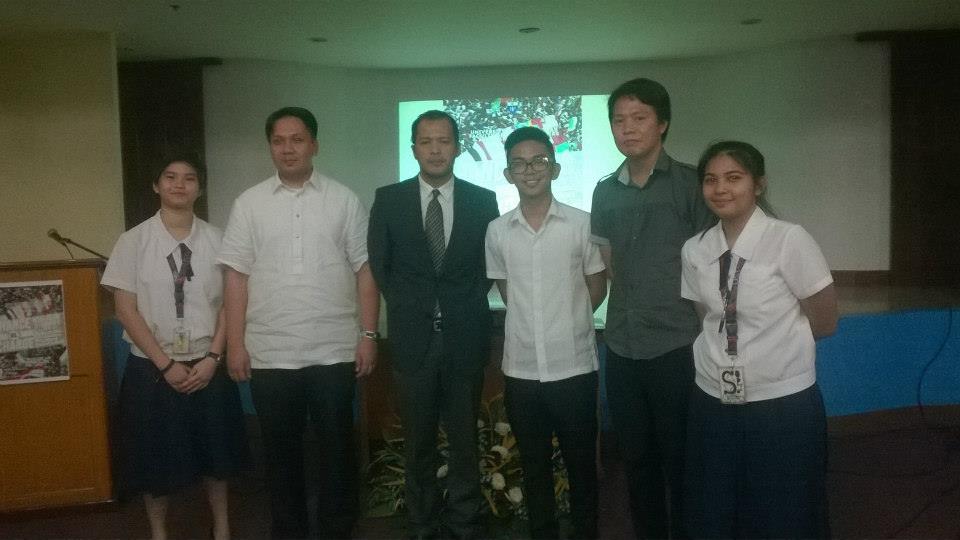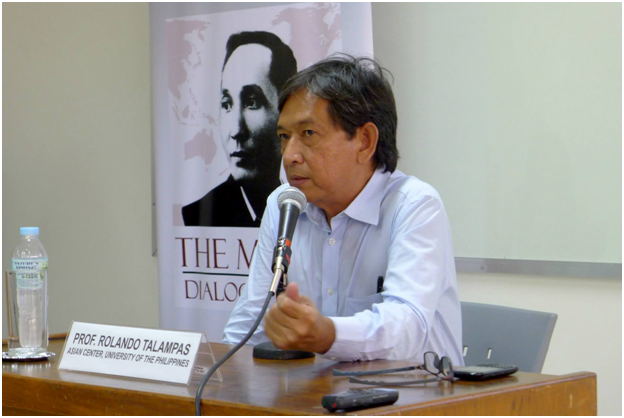 Last month, two faculty members of the Asian Center lectured on various issues affecting the Middle East—the ISIS, the Arab-Israeli conflict, and Middle Eastern politics—at the University of Santo Tomas, San Beda College Alabang, and the Foreign Service Institute.
Last month, two faculty members of the Asian Center lectured on various issues affecting the Middle East—the ISIS, the Arab-Israeli conflict, and Middle Eastern politics—at the University of Santo Tomas, San Beda College Alabang, and the Foreign Service Institute.
Dr. Henelito Sevilla, Jr., Assistant Professor, presented “Change and Chance: West Asian Dilemma between Democratic Transition and Cultural Preservation" on 30 September 2014 at the University of Santo Tomas, In this lecture, he discussed the nature of Middle Eastern politics and its implications on democratization within the region, arguing that “calls for democratization are held up or sabotaged” by various state, non-state, and extraregional actors pursuing their own interests. He also described the political cultures of the Middle East, the nature and failure of Westernization in the region, classified the various governments, and the political impact of tribalism and factionalization amidst democratization initiatives in light of the Arab Spring.
Earlier last month, on 4 September, Dr. Sevilla, Jr. explored the “Arab-Israeli Conflict in International Relations Perspectives” at San Beda College Alabang, Metro Manila. He argued that the Arab-Israeli conflict is a reflection of a flawed imperial decision in the early 20th century to create a state of Israel (using the United Nations), a move that disregarded the sentiments and aspirations of the local Arab and Palestinian population. He pointed out the embedded interests of the involved actors and the institutional weaknesses of the UN to resolve this six-decade-old crisis.
Dr. Sevilla obtained his Ph.D. in International Relations from the University of Tehran. He coordinates the West Asia Studies MA program of the Asian Center and teaches MA courses on the International Relations of West Asia, Energy and Security in the Greater Middle East, and on Philippine foreign policy. Photo: Dr. Henelito Sevilla, Jr (3rd from left) with UST faculty and students. Courtesy of the University of Santo Tomas.
 Last 11 September, Associate Professor Rolando Talampas delivered his lecture on "ISIS and the CRISIS: Some Views on Middle East Developments and the Overseas Filipinos" at the Foreign Service Institute (FSI). According to an FSI press release, he discussed the “fluid and volatile nature of the Middle East crisis, which has emboldened radical (reportedly) Wahhabi-inspired Islamist/jihadist/militant groups;” examined the “the cultural politics and the dynamics of relations among various regional actors post-Arab Spring;” and “expressed skepticism on these political upheavals across the region since Islamists and secularists have diametrically opposed visions and goals.” Opining that the situation will further deteriorate, he also touched on how Overseas Filipino Workers in the region have been affected by the crisis, and stressed the need to link up with various agencies to facilitate repatriation. The lecture was held as part of the Mabini Dialogue Series of the FSI’s Center for International and Strategic Studies. Read the FSI press release for more details.
Last 11 September, Associate Professor Rolando Talampas delivered his lecture on "ISIS and the CRISIS: Some Views on Middle East Developments and the Overseas Filipinos" at the Foreign Service Institute (FSI). According to an FSI press release, he discussed the “fluid and volatile nature of the Middle East crisis, which has emboldened radical (reportedly) Wahhabi-inspired Islamist/jihadist/militant groups;” examined the “the cultural politics and the dynamics of relations among various regional actors post-Arab Spring;” and “expressed skepticism on these political upheavals across the region since Islamists and secularists have diametrically opposed visions and goals.” Opining that the situation will further deteriorate, he also touched on how Overseas Filipino Workers in the region have been affected by the crisis, and stressed the need to link up with various agencies to facilitate repatriation. The lecture was held as part of the Mabini Dialogue Series of the FSI’s Center for International and Strategic Studies. Read the FSI press release for more details.
This semester, Associate Professor Talampas is handling two courses on Southeast Asia, including that on social and economic development in the region. He also teaches a class on the Philippines' response to various disasters, and on Theories and Perspectives in Philippine Studies. Photo: Associate Professor Rolando Talampas. Courtesy of the Foreign Service Institute.
The Asian Center offers masters degrees in Asian Studies covering four areas of specialization: Northeast Asian Studies, Southeast Asian Studies, South Asian Studies, and West Asian Studies. The Center also offers an M.A. and a Ph.D. program in Philippine Studies. Like the Asian Center on Facebook or follow us on Twitter @upasiancenter.

